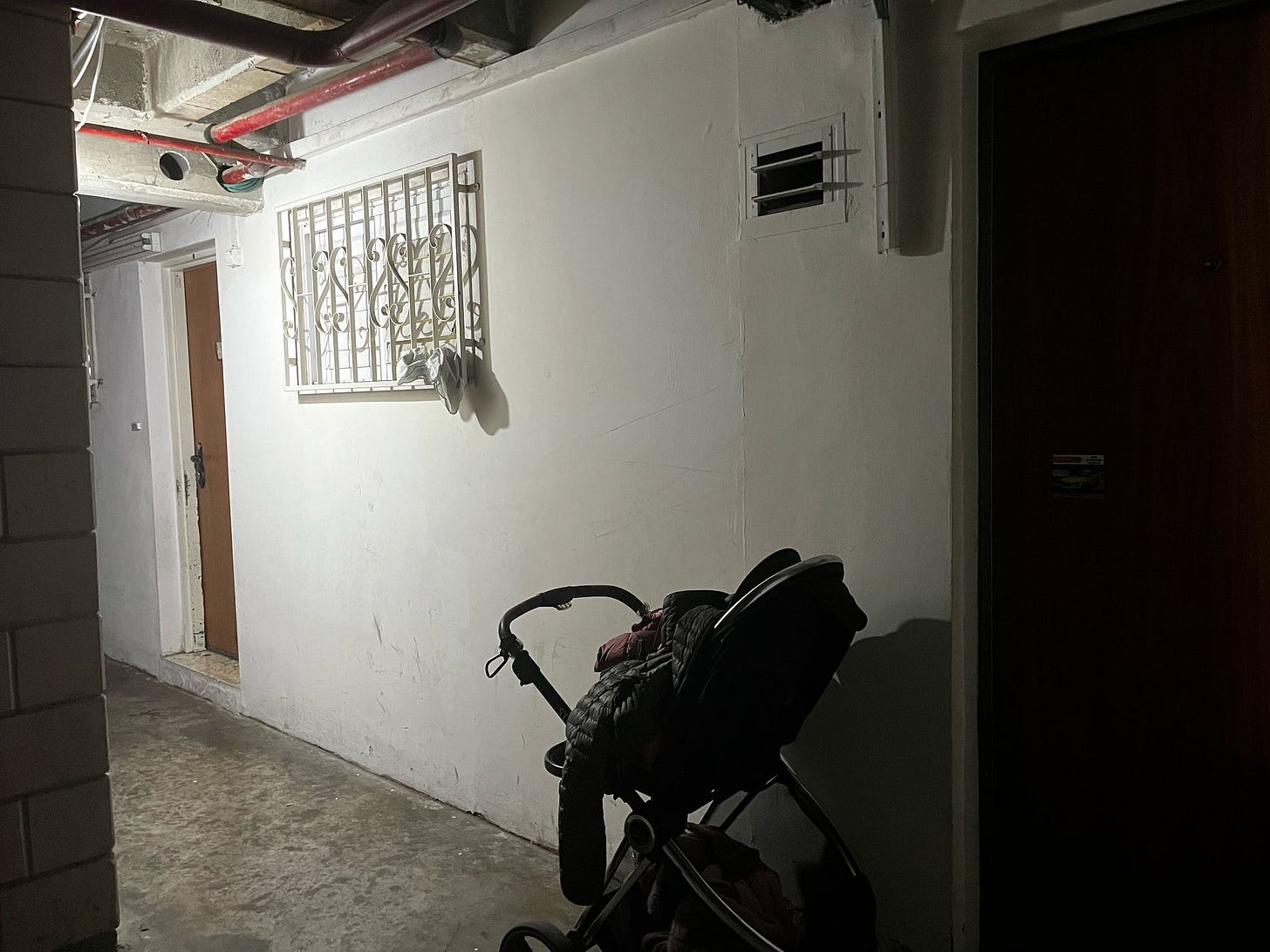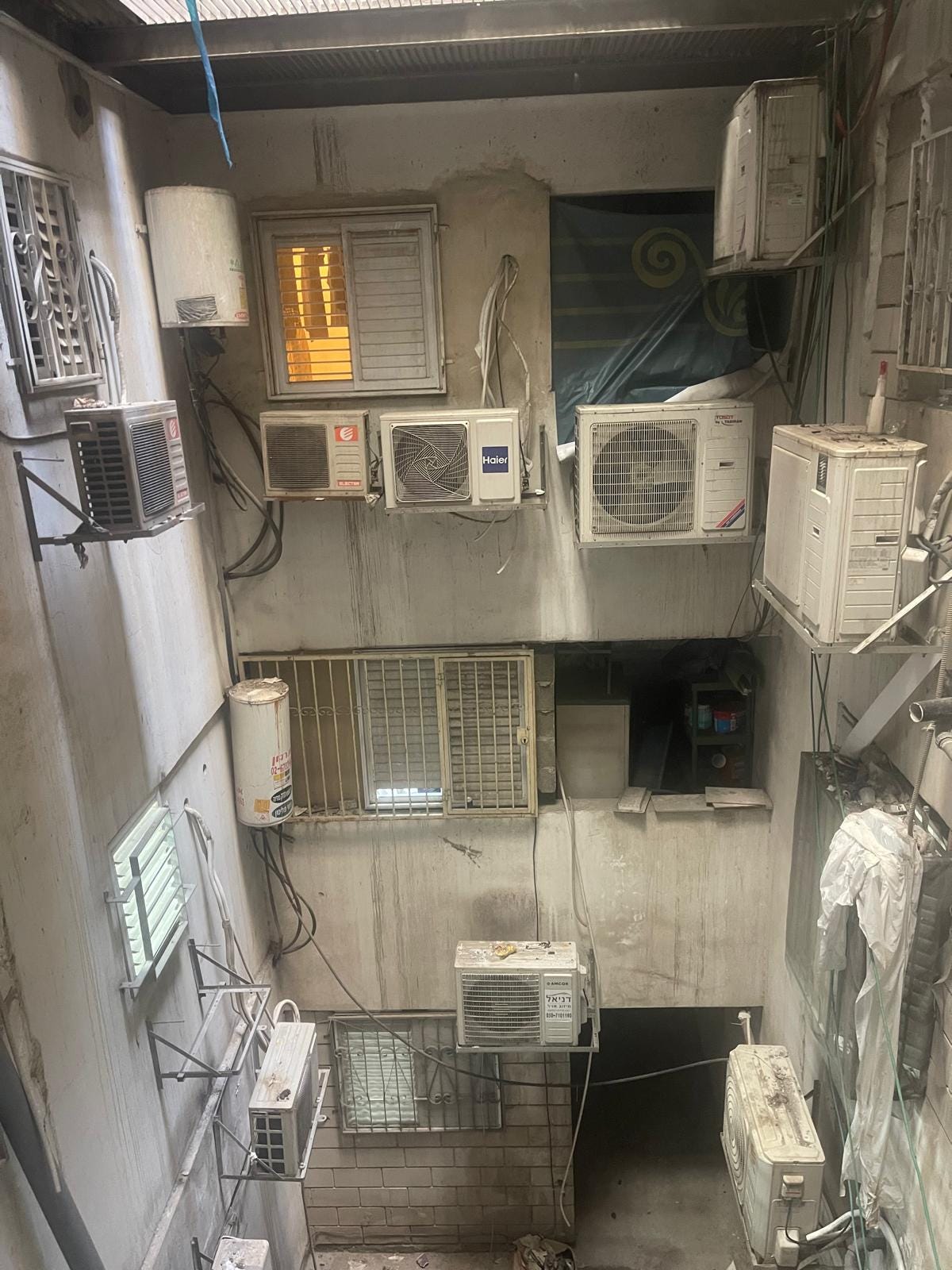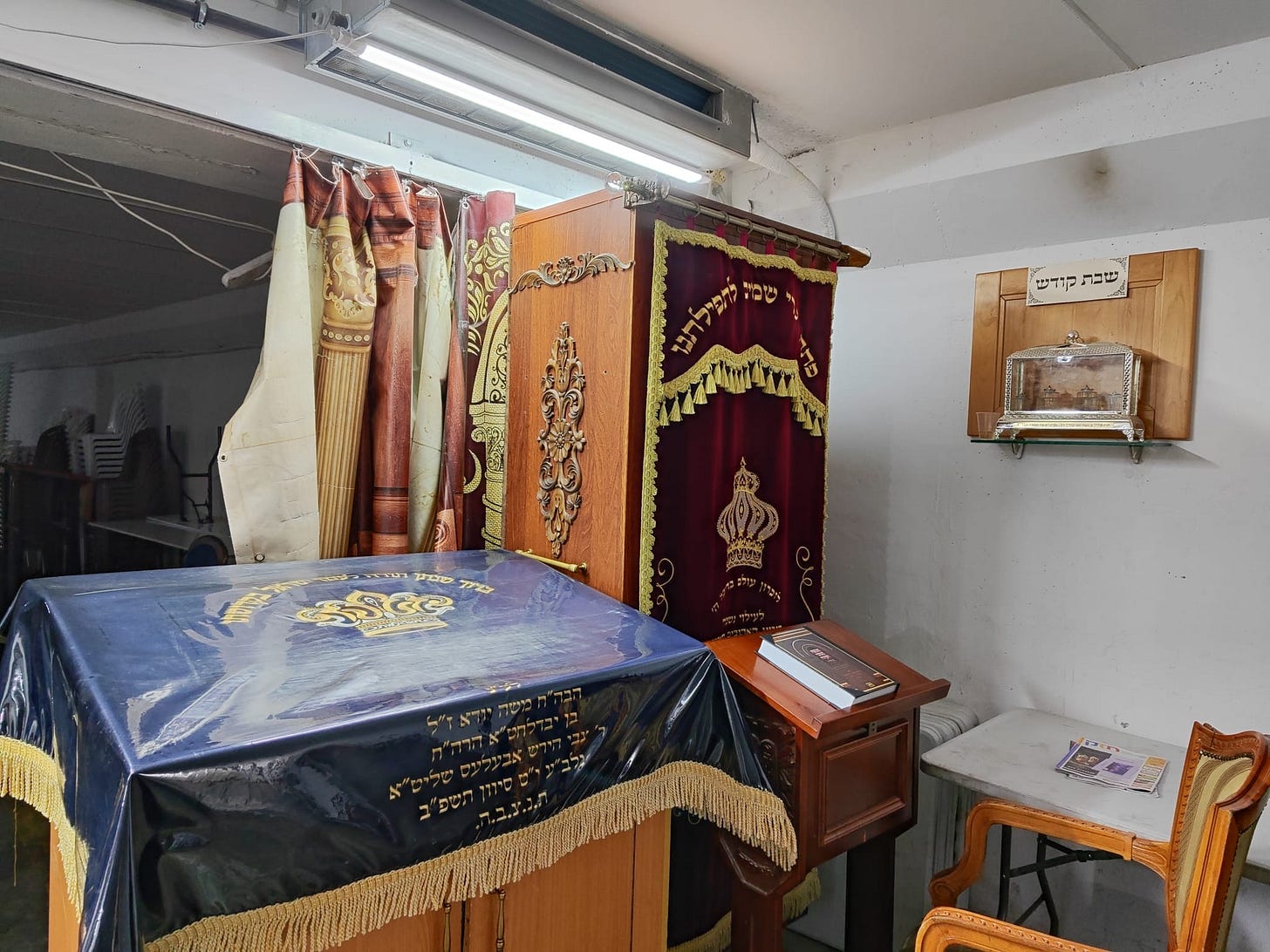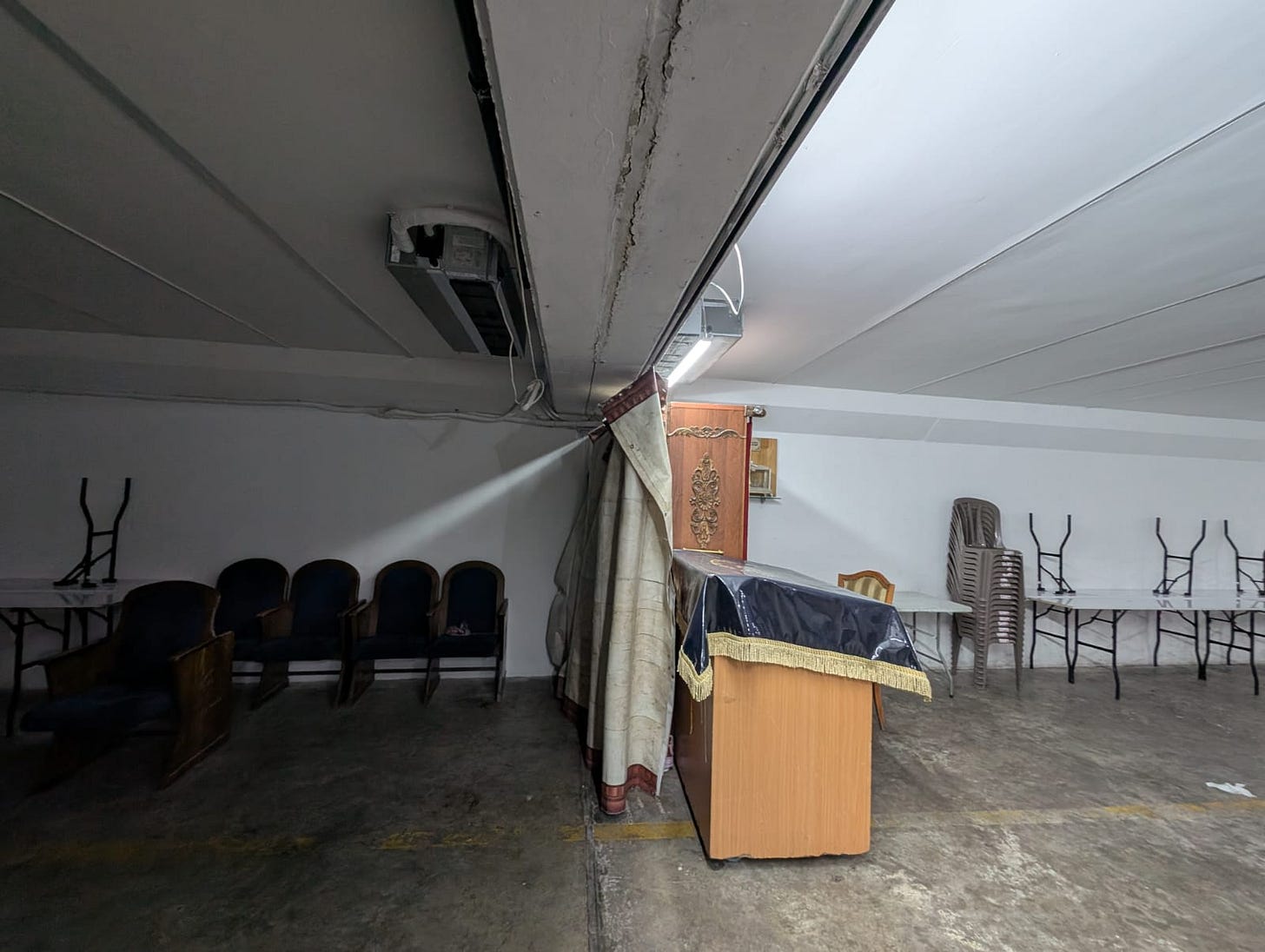Guest Post: The Secret World of Jerusalem's Parking Lots
How the Haredim are pioneering Israel's latest urban planning trend
It’s time once again to hand over the keys to Love-of-the-Land HQ to my wife Merav, with a piece (translated from the Hebrew by me) about a fascinating urban development in Jerusalem. And for those who missed it, here’s her piece from October 2024 about living opposite Mount Herzl during the war.
Ganei Geula (the ‘Gardens of Redemption’) is an ugly and generic housing building in the Jerusalem neighborhood of Romema. Whoever walks along Tchelet Mordechai Street might easily miss its parking lot, which surprisingly has a separate entrance for cars and pedestrians. Why does it need a pedestrian entrance? If you’re asking it means you’re probably not from here, one of the local residents will answer. Because everyone knows that the Ganei Geula parking lot isn’t just a place to park your car but an entire world of its own.
A curious pedestrian will enter the darkened parking lot and be surprised by the lack of cars. Instead, they’ll find residential apartments for young couples, a kosher internet cafe, a wig salon, women’s lingerie stores, a gym, and even a synagogue that’s open on Shabbat.
This is happening because Ganei Geula and its parking lot are in the beating heart of Haredi Jerusalem – the biggest and liveliest Haredi center in Israel – where everyone wants to live, study, or shop, but land is prohibitively expensive. The Haredi public, with an average of six children per family and a strict religious way of life, is excellent at finding creative solutions for its needs, though – solutions which sometimes tread the boundaries between legal and illegal.
“I learned from Inbar Weiss, Beit Shemesh’s municipal planner, that building violations are the best form of public participation,” says Shulamit Monsonego, a Haredi urban planner and the head of the Haredi Planning Forum. “Through building violations, we can understand what the public really needs, and what’s different from the original plans for a particular space.”
Shulamit investigated the Romema parking lots as part of her work with the Urban Clinic at the Hebrew University, discovering several surprising things about the needs of the Haredi public and the way in which land originally built for a parking lot serves a completely different purpose.
First, Haredim don’t need so much parking. Many of them don’t use private vehicles at all, and few families own two cars. Until recently there were Hasidic groups that prohibited obtaining a driving license, and there are still communities whose children might find it difficult to get accepted into Haredi educational institutions if their mother drives.
Another issue is the acute Haredi need for housing. Haredi women commonly marry at 20 and men at 22, and a newlywed couple need to immediately move into their own apartment. Living with the parents isn’t possible when a couple plans to have so many children. But young couples do want to live close to their parents, so some of them end up renting an apartment in the parking lot. This is also a financial opportunity that is very appealing to apartment owners who don’t use their parking space and are eager to rent it out to a young couple. At Ganei Geula the price of a 35-square-meter housing unit in the parking lot can reach up to NIS5,000 per month. To allow the tenants a little air and sunlight the housing units tend to be located next to the building’s ventilation shafts, and many install ventilation fans in the home. “From the inside it’s really fine, and there’s plenty of parking,” quips Simcha, who spent a month renting one of the apartments in the parking lot.
It’s also surprising to find quite a few shops in the parking lot, even if they’re not traditional Haredi stories. “I learned that there are certain kinds of commerce that actually benefit from being hidden from the eye by not being on the street,” Shulamit says. “For example, I spoke with the owner of a women’s lingerie store. She said that even if they paid her, she wouldn’t move her store to street level.” The conservative nature of Haredi society means that these kinds of stores are more hidden. Other examples are the gym, the wig salons, and the kosher internet cafe. While none of these are forbidden, the Haredi public prefers for them not to be so visible, but instead to be in a more hidden place where it’s impossible to see who’s using them.
“I asked myself what I could do with all the knowledge that I’ve gathered about life in the parking lot,” Shulamit says. “There are three options. First, allowing everything. As urban planners, though, we’ve got a responsibility for public safety so that’s a non-starter. Second, to continue prohibiting additional uses of the parking lots, but that’s the current reality, and the law isn’t stopping people from living, shopping, and studying there. The communal needs are overcoming the prohibitions. Third, we could recognize these uses and regulate them – that is, we can allow life in the parking lots, while also ensuring suitable conditions with proper ventilation, in a way that doesn’t harm public health and guarantees public safety.
The solution probably lies in a forward-thinking understanding of the urban space. “The global trend is towards less use of cars, and maybe in a few years we’ll transition to autonomous vehicles or another transport solution that is still unknown, and we won’t need so many parking spaces. Therefore, maybe the key word is “flexible planning” – allowing other uses of the parking lots, with suitable conditions and according to the law.”
Not far from Ganei Geula is the Rav Shefa Mall. This mall underwent the entire transformation: a resourceful entrepreneur decided to legally transform the empty parking lots into a vibrant and thriving mall – all underground. You can see some footage of the mall here.
Thanks to Emily Silverman, Noga Rippin, and Shachar Shoham for the pictures.









Very interesting and entertaining to read, as always. Thank you both.
So interesting - Thank you for this fascinating piece.